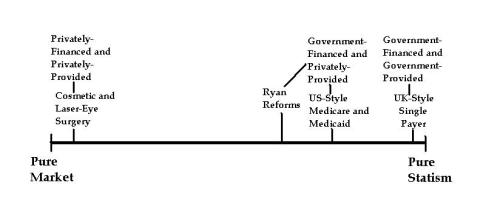I’m never guilty of being an optimist, but two items caught my attention today that suggest the tide may be turning on entitlement reform.
We’ll start with something from the New York Times.
Regular readers know that I’ve criticized that paper on a few occasions.
Sometimes it’s because of silly editorializing, such as this bit of amateur political analysis by Thomas Friedman, this foolish look at international taxation by the editors, and this laughable column arguing that America should copy Italy’s fiscal policy.
I also hit them for ignorant reporting, such as the story implying that things are free when they’re financed by government, this column that inadvertently makes the opposite point from what was intended, and this story mis-characterizing tax reform.
Paul Krugman, needless to say, is in a league of his own. I’ll just cite this beatdown about Estonia and leave it at that.
But it’s also important to cite good journalism when it occurs, and a new story in the New York Times on healthcare is a prime example. It’s straightforward and unbiased. And it shows the benefits of even small steps in the direction of markets. Here’s some of what Robert Pear wrote.
Even as President Obama accuses Mitt Romney and Representative Paul D. Ryan of trying to privatize and “voucherize” Medicare, his administration crows about the success of private health plans in delivering prescription drug benefits and other services to Medicare beneficiaries. More than a quarter of the 50 million beneficiaries receive coverage through private Medicare Advantage plans, mostly health maintenance organizations, and Medicare’s drug benefits are delivered exclusively by private insurers, subsidized by the government. …“Medicare Advantage premiums down 7 percent on average, enrollment up 10 percent,” the administration announced in February, and it said the quality of care under Medicare Advantage was improving. This month the administration reported the results of competitive bidding for 2013: “Medicare prescription drug premiums to remain steady for third straight year.” Federal spending on Medicare drug benefits has been about 30 percent lower than the Congressional Budget Office predicted when the drug legislation was passed in 2003. Mr. Ryan, a Wisconsin Republican who is the chairman of the House Budget Committee, said the drug program “came in below cost projections because it harnessed the power of choice and competition.”
Recommended
Pear’s article raises an interesting issue about incremental reform. Proponents of liberty and markets obviously don’t like government-financed healthcare, but there are very-bad ways of doing the wrong thing and there are less-bad ways of doing the wrong thing.
That’s never an argument for doing something bad, but if bad policies already are implemented, then it does make sense to grab any opportunity to make those policies less destructive.
Ideally, we should restore free markets overnight. But given the constraints of the political system, I’ll gladly take the modest reforms that Paul Ryan is proposing for Medicare and Medicaid.
Here’s a back-on-the-envelope image I created to show the spectrum of healthcare policy. It’s obviously very simplified, but I think the overall point about Ryan’s reforms being very incremental is correct.
One final point about the political implications. President Obama clearly wants to scare seniors into thinking that the Ryan reforms are radical, but this is why the New York Times article is significant. It shows that Ryan isn’t proposing anything unusual, and it shows that the incremental reforms being proposed have a successful track record.
This may be why we’re now seeing some remarkable poll results.
Despite a furious onslaught of negative ads and harsh rhetoric, neither President Obama nor Mitt Romney has much of an advantage on critical issues heading into the fall campaign. …On Medicare — long considered a political vulnerability for Romney and his running-mate Paul Ryan — 49 percent of likely voters say Obama would handle the issue better while 48 percent prefer Romney. On health care, voters are just as divided — with 49 percent favoring Obama’s policies and 48 percent favoring Romney.
P.S. Since I’m favorably commenting on an article from the New York Times, allow me to remind you that the paper does publish good material every so often. They allowed this great column on tax sovereignty on their editorial pages, this powerful expose of IRS abuse by a business columnist, and this great graphic on the connection between big banks and government bailouts in Europe.


























Join the conversation as a VIP Member